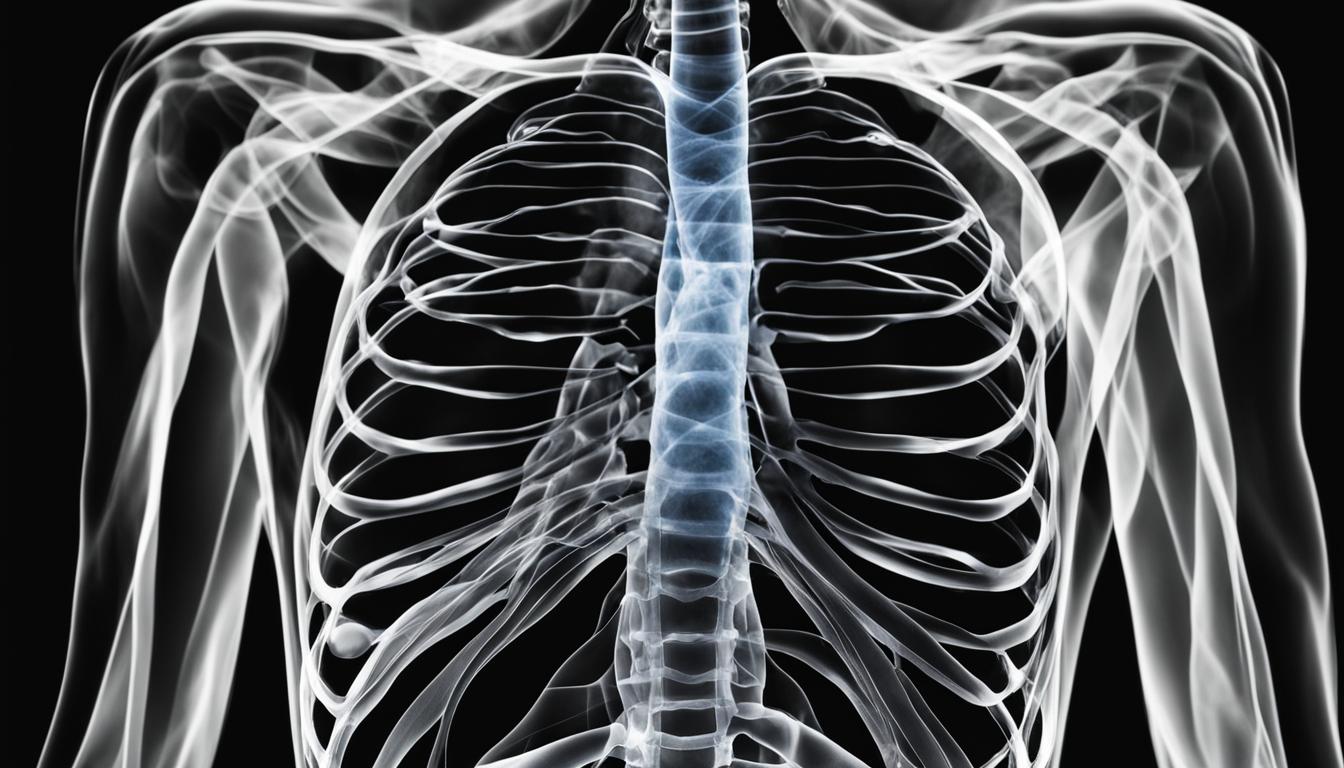Experiencing chest pain when taking a deep breath can be a cause for concern. It’s a symptom that can indicate various conditions, some of which can be serious. While it can be caused by muscle strains, panic attacks, or infections, it can also be a sign of underlying issues like asthma, heart problems, or even cancer.
If you are wondering why you experience chest pain when deep breathing, it is important to seek medical attention for diagnosis and appropriate treatment. In this article, we will explore the possible causes of chest pain when taking a deep breath and provide tips for finding relief from the discomfort.
So, let’s delve into the common causes of chest pain when breathing deeply, including heart-related causes, lung-related causes, and other potential factors. By understanding the underlying causes, you can take steps towards proper treatment and peace of mind.
Why Does My Chest Hurt When I Take a Deep Breath?
Chest pain when breathing can be a distressing symptom that is associated with various medical conditions and injuries affecting the heart, lungs, and nearby tissues. Understanding the common causes of chest pain when taking a deep breath can help you identify potential underlying issues and seek appropriate medical attention. Here are some of the common causes:
- Pleural Issues: The pleura, which is the membrane surrounding the lungs, can become inflamed or infected, leading to chest pain when breathing deeply.
- Ligament and Muscle Problems: Injury or strain to the ligaments and muscles in the chest can cause sharp chest pain, especially when taking deep breaths.
- Thoracic Spine Conditions: Issues with the thoracic spine, such as herniated discs or muscle spasms, can radiate pain to the chest when inhaling deeply.
- Pericardial Inflammation: Inflammation of the pericardium, the lining around the heart, can cause chest discomfort when taking a deep breath.
- Esophageal Problems: Conditions like gastroesophageal reflux disease (GERD) or esophageal spasms can lead to chest pain when breathing deeply.
- Breast-Related Causes: In some cases, chest pain may be related to breast issues, such as mastitis or a breast abscess.
It’s important to note that these are just some of the common causes of chest pain when breathing, and there may be other underlying conditions. If you experience chest pain while breathing deeply, it’s essential to consult a healthcare professional for an accurate diagnosis and appropriate treatment. Remember, proper medical evaluation is crucial, especially if the chest pain is severe or accompanied by other concerning symptoms.
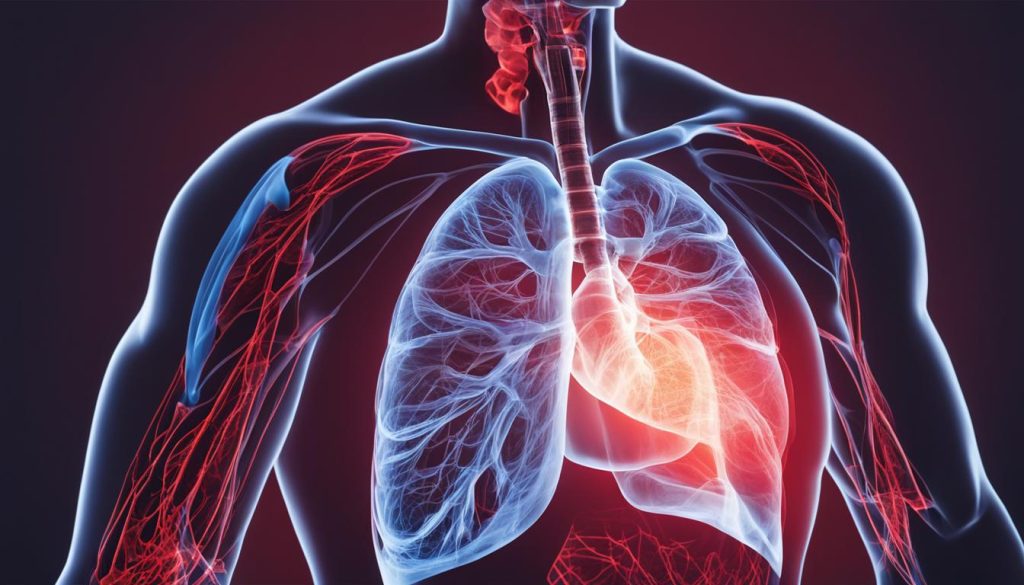
Heart-related Causes of Chest Pain When Breathing
Understanding Heart-Related Causes
Chest pain when breathing deeply can often be a result of various heart-related conditions. These conditions can range from mild to severe and require prompt medical attention. Some common heart-related causes of chest pain when taking a deep breath include:
- Myocardial infarction (heart attack): This occurs when the blood flow to a part of the heart muscle is blocked, leading to chest pain and discomfort. It is important to seek immediate medical help if you experience severe chest pain when breathing deeply, as it may be a sign of a heart attack.
- Pericarditis: Inflammation of the pericardium, the thin sac that surrounds the heart, can cause chest pain that worsens with deep breathing. The pain is often sharp and may be accompanied by a fever.
- Aortic dissection: This is a tear in the inner lining of the aorta, the large blood vessel that carries blood from the heart. Aortic dissection can cause severe chest pain when breathing deeply, along with other symptoms such as sudden onset of sharp, tearing pain and a difference in blood pressure between the arms.
- Pulmonary hypertension: High blood pressure in the pulmonary artery, which supplies blood to the lungs, can lead to chest pain and discomfort when taking a deep breath.
Recognizing Heart-Related Symptoms
In addition to chest pain when breathing deeply, heart-related causes may also present with other symptoms. These symptoms can include:
- Chest discomfort or tightness
- Shortness of breath
- Pain radiating to the arm(s), shoulders, jaw, back, neck, or upper abdomen
- Dizziness or lightheadedness
- Cold sweats
- Nausea or vomiting
Recognizing these symptoms is essential as they can indicate a potentially life-threatening situation. If you experience chest pain while breathing deeply, especially if accompanied by any of the above symptoms, it is crucial to seek emergency medical help immediately.
| Heart-Related Causes | Key Symptoms |
|---|---|
| Myocardial infarction (heart attack) | Severe chest pain, shortness of breath, pain radiating to other parts of the body |
| Pericarditis | Sharp chest pain, worsens with deep breathing, fever |
| Aortic dissection | Sudden, severe chest pain, tearing sensation, difference in blood pressure between arms |
| Pulmonary hypertension | Chest pain, discomfort when taking a deep breath, shortness of breath |
Lung-related Causes of Chest Pain When Breathing
Although the lungs themselves do not have pain receptors, there are several medical conditions involving the lungs that can cause chest pain when breathing. One common cause is pleurisy, which is the irritation of the pleura. Pleuritic chest pain can be caused by various conditions, including lung cancer, mesothelioma, and malignant pleural effusions (fluid buildup in the pleura).
Other lung-related causes of chest pain when breathing include:
- Asthma: A chronic condition that causes inflammation and narrowing of the airways, leading to chest tightness and discomfort when breathing deeply.
- Pneumonia: An infection in the lungs that causes inflammation and fluid accumulation, resulting in chest pain, cough, and difficulty breathing.
- Tuberculosis: A bacterial infection that primarily affects the lungs, causing chest pain, persistent cough, and fever.
- COVID-19: The respiratory illness caused by the novel coronavirus can cause chest pain, along with other symptoms like cough, shortness of breath, and fever.
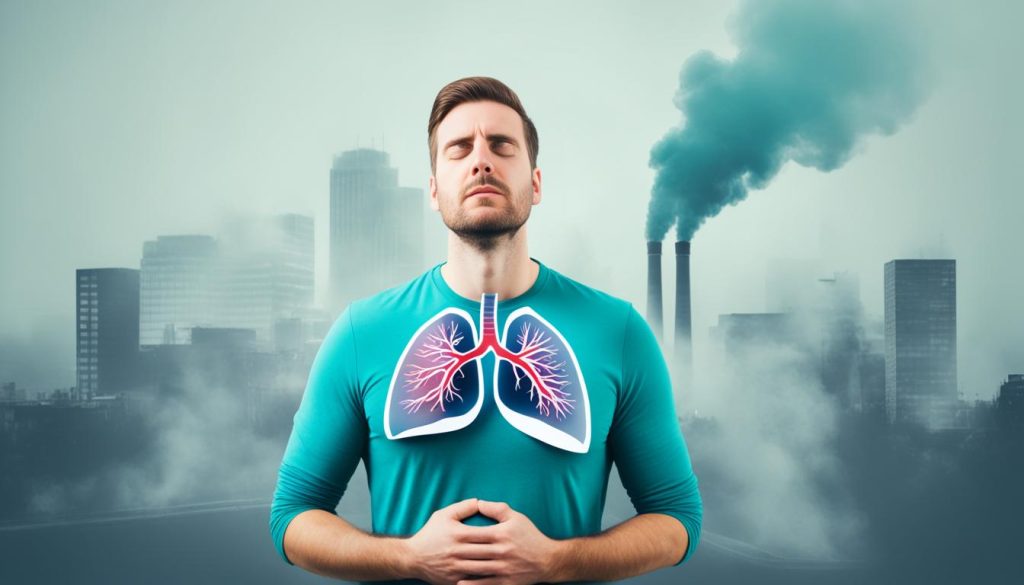
These conditions may also be accompanied by symptoms such as coughing, shortness of breath, fever, and fatigue. If you experience chest pain when breathing deeply, it is important to consult a healthcare professional for an accurate diagnosis and appropriate treatment.
Other Causes of Chest Pain When Breathing
While chest pain when breathing is often associated with heart or lung issues, there are several other potential causes to consider. These include:
- Rib fractures: Injuries to the ribs can cause sharp chest pain when inhaling deeply.
- Costochondritis: Inflammation of the cartilage between the ribs and sternum can lead to chest discomfort when taking a deep breath.
- Panic attacks: Intense moments of anxiety or panic can cause chest tightness and potentially result in pain when breathing deeply.
- Hemothorax: Accumulation of blood in the pleural space can cause chest pain and difficulty breathing.
- Shingles: The viral infection known as shingles can result in chest pain along with a characteristic rash.
- Gastroesophageal reflux disease (GERD): Acid reflux and heartburn can cause chest discomfort, especially when taking a deep breath.
It is important to note that these conditions may present with additional symptoms beyond chest pain. Consulting with a healthcare professional is crucial for proper evaluation and diagnosis.
Below is a table summarizing the other causes of chest pain when breathing:
| Cause | Symptoms |
|---|---|
| Rib fractures | Sharp pain, tenderness, difficulty breathing |
| Costochondritis | Pain and swelling around the sternum, exacerbated by deep breaths or movements |
| Panic attacks | Chest tightness, rapid heartbeat, shortness of breath |
| Hemothorax | Chest pain, difficulty breathing, rapid breathing |
| Shingles (herpes zoster) | Chest pain, burning sensation, rash |
| Gastroesophageal reflux disease (GERD) | Heartburn, acid reflux, chest discomfort |
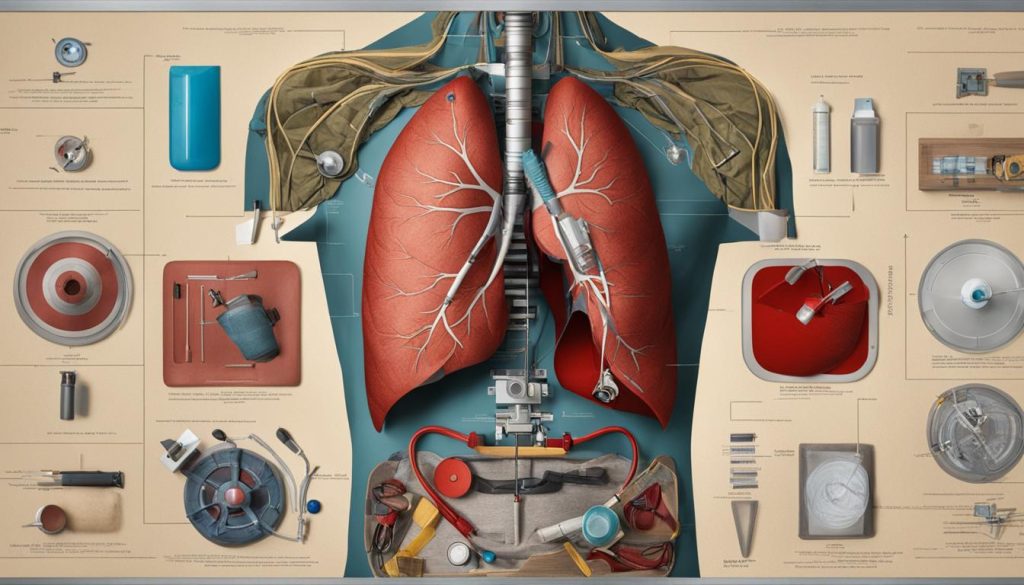
Diagnosis and Treatment of Chest Pain When Breathing
The diagnosis of chest pain when breathing involves a thorough evaluation by a healthcare professional. Depending on the suspected underlying cause, various diagnostic tests and procedures may be recommended to identify the source of the pain. These examinations help rule out serious conditions and determine the appropriate treatment approach.
Diagnostic Steps
The specific diagnostic steps for chest pain when breathing will depend on the individual’s symptoms and medical history. Common diagnostic procedures include:
- Physical examination: A healthcare professional may perform a physical examination to assess the chest area for any abnormalities.
- Imaging tests: Chest X-rays or CT scans may be conducted to visualize the structures within the chest and identify potential abnormalities.
- Blood tests: Blood tests can provide valuable information about potential infections, inflammation, or other underlying conditions.
- Bronchoscopy or thoracoscopy: In some cases, a bronchoscopy (examination of the airways) or thoracoscopy (examination of the pleural space) may be performed to further investigate the cause of the chest pain.
By combining the results of these diagnostic tests and procedures, healthcare professionals can make an accurate diagnosis and determine the appropriate treatment.
Treatment Options
The treatment for chest pain when breathing will vary based on the underlying cause. Here are some common treatment options:
| Underlying Cause | Treatment Options |
|---|---|
| Infections | Antibiotics may be prescribed to treat bacterial infections. Antiviral medications may be used for viral infections. |
| Autoimmune Conditions | Corticosteroids or immunosuppressive drugs may be prescribed to reduce inflammation and alleviate symptoms. |
| Pain Relief | Nonsteroidal anti-inflammatory drugs (NSAIDs), such as ibuprofen, may be recommended to relieve pain and reduce inflammation. |
| Surgical Intervention | In severe cases or when other treatment options fail, surgery may be necessary to address the underlying cause of chest pain. |
It is important to note that the specific treatment options will depend on the underlying condition causing the chest pain when breathing. Healthcare professionals will tailor the treatment plan to each individual’s needs, considering factors such as the severity of symptoms, overall health, and medical history.
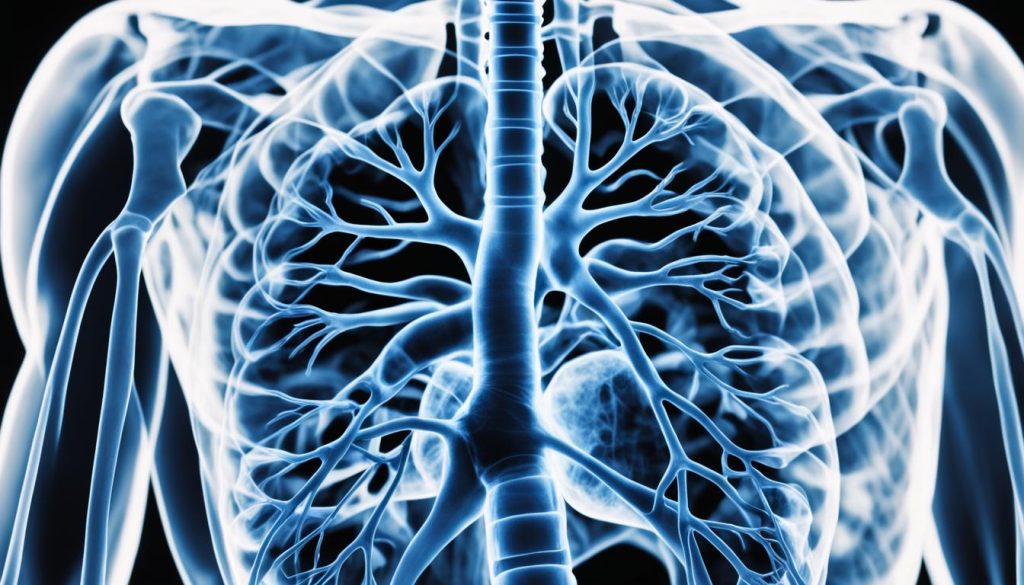
Conclusion
Chest pain when taking a deep breath can be caused by a range of factors, from minor muscle strains to more serious conditions affecting the heart, lungs, or surrounding tissues. If you experience chest pain when breathing deeply, it is crucial to seek medical attention, especially if accompanied by symptoms like shortness of breath, fever, or dizziness. Consulting with a healthcare professional can help determine the underlying cause and provide appropriate treatment options for relief.
Remember, prompt medical attention is essential in cases of suspected heart-related chest pain, as it may indicate a serious condition that requires immediate treatment. By seeking timely healthcare, you can ensure proper diagnosis and appropriate management of your symptoms.
Whether the cause is a muscle strain, an infection, or a more severe condition, do not ignore chest pain when taking a deep breath. Reach out to a healthcare professional, who can evaluate your symptoms and guide you towards the best course of action for your specific situation.
FAQ
1. What are the common causes of chest pain when breathing?
Common causes of chest pain when breathing include issues with the pleura (the membrane surrounding the lungs), ligaments and muscles in the chest, the thoracic spine, the pericardium (lining of the heart), the esophagus, and even the breasts. Other symptoms may accompany the chest pain, such as coughing, shortness of breath, and fever.
2. What are the heart-related causes of chest pain when breathing?
Heart-related causes of chest pain when breathing include myocardial infarctions or heart attacks, pericarditis (inflammation of the pericardium), aortic dissection (a tear in the aorta), and pulmonary hypertension (high blood pressure in the pulmonary artery). Symptoms of heart-related chest pain may include chest discomfort, shortness of breath, and pain radiating to other areas of the body.
3. What are the lung-related causes of chest pain when breathing?
Lung-related causes of chest pain when breathing include pleurisy, asthma, pneumonia, tuberculosis, and COVID-19. These conditions can cause irritation or inflammation in the lungs, resulting in chest pain. Symptoms may also include coughing, shortness of breath, and fever.
4. What are the other causes of chest pain when breathing?
Other causes of chest pain when breathing include rib fractures, costochondritis, panic attacks, hemothorax, shingles, and gastroesophageal reflux disease (GERD). These conditions may have additional symptoms accompanying the chest pain.
5. How is chest pain when breathing diagnosed and treated?
The diagnosis of chest pain when breathing may involve a physical examination, imaging tests, blood tests, and potential procedures. The specific diagnostic steps will depend on the suspected underlying cause. Treatment options will also vary based on the underlying condition and may include medications, pain relief, or surgical interventions.

